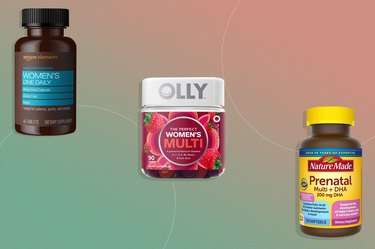
Pregnancy can be a joyful if somewhat overwhelming experience. As soon as you get that positive test, your mind may start spinning with thoughts of maternity clothes, nursery decor and, of course, how to have the healthiest pregnancy possible.
That's where prenatal vitamins come in. If you're expecting — or even just thinking about becoming pregnant — you should start taking one ASAP.
Video of the Day
Video of the Day
Here, we'll help you select the best prenatal vitamin for you and your pregnancy.
The Best Prenatal Vitamins
- Best Overall: Nature Made Prenatal + DHA ($18.29, Amazon)
- Best on a Budget: Deva Prenatal ($14.99, Amazon)
- Best Gummy: Olly Essential Prenatal ($12.10, Amazon)
- Best Powder: Needed Prenatal Multi ($69.99, Thisisneeded.com)
How We Chose
We tapped Kerry-Ann Kelly, MD, an ob-gyn with Spora Health, and McKenzie Caldwell, MPH, RDN, a fertility and prenatal dietitian, for their insight on what makes a great prenatal vitamin.
Our top picks below are based on their recommendations, and each has been third-party tested to ensure it contains what's stated on the label and has not been contaminated with heavy metals.
Find more information on how we choose products here.
Why You Need a Prenatal
Good nutrition is essential during pregnancy, but doctors also recommend taking a supplement because your body has increased needs when it's growing a tiny human. You may think that any reputable multivitamin will do, but these supplements may not be giving you — or your baby — everything you need to stay healthy.
Think about it this way: You're building a baby from scratch — bones, eyes, skin, brain — and that requires nutrients. If you don't have an ample supply from your diet, your baby is going to take what you have and you will become deficient. Take bones for example — that baby needs an entire skeleton, which requires a lot of calcium. If you are deficient in calcium, the baby will pull from your bones, according to the National Institutes of Health (NIH).
"In pregnancy, maternal nutrition is just as important as fetal nutrition," Caldwell says. "Getting enough folate, B vitamins, iron, vitamin D, choline and DHA from food sources and in supplements is critical to support your baby's growth and also keep you healthy too."
The American College of Obstetricians and Gynecologists (ACOG) recommends the following nutrients as necessary during pregnancy:
Folic Acid
Recommended daily amount: 400 mcg (from supplements)
Folic acid is a B vitamin. It's one form of folate (vitamin B9) that's used in supplements and some fortified foods like breakfast cereals, rice, bread and pasta, according to the Centers for Disease Control and Prevention (CDC). The daily recommended amount to grow a baby is typically 600 mcg, though, it's hard to this get from food alone, so the recommended supplemental amount is 400 mcg.
And because this might be the most controversial nutrient right now in prenatal health, it's important to start here.
"Folates are one of the most critical nutrients to get during pregnancy," Dr. Kelly says. "That's because folates play a key role in helping your baby develop a healthy brain and spinal cord, and decrease the risk of having a premature birth or low-weight baby. The nutrient is also essential in creating red blood cells, protein and DNA."
The controversy is around folic acid vs. another form of folate found in some supplements: 5-methyltetrahydrofolate (aka methyl-folate or MTHF folate). "Folic acid is a synthetic form of folate typically found in vitamins or fortified foods that cannot be directly used by the body," Dr. Kelly says. "When broken down in the body, folic acid is converted into MTHF folate and can be used directly by the body."
That may be why some supplements have MTHF folate instead of folic acid. But while Caldwell calls this form of the nutrient "promising" for prenatal health, the effectiveness of supplements with methyl-folate in preventing neural tube defects has not been studied, per the CDC, and they are not recommended by ACOG, the CDC or other leading health organizations.
Currently, the CDC and ACOG only recommend folic acid supplementation for the prevention of neural tube defects. With that in mind, our top picks below include only supplements with folic acid or whole-food folate.
But have a conversation with your doctor to get a recommendation for the best form of folate for you, taking into consideration your current diet any special medical needs.
Calcium
Recommended daily amount: 1,000 mg (1,300 mg for pregnant people ages 14-18)
Dr. Kelly recommends pregnant people get 1,000 milligrams of calcium per day to support strong bones and teeth for themselves and for their baby.
"Calcium can also help healthy functioning of the circulatory, muscular and nervous systems," she adds.
Iron
Recommended daily amount: 27 mg
Iron is often part of a prenatal vitamin due to the large increases in blood volume that occur during pregnancy.
"Iron helps to deliver essential oxygen to your baby, so this is absolutely a good supplement to consider," Dr. Kelly says. Low iron levels may also lead to headaches or fatigue, she adds.
Omega-3 Fatty Acids
No specific daily recommendation
You may find omega-3s in your prenatal, but if you don't, it's important to get a recommendation from your doctor on supplementation.
"Omega-3 fats help us regulate hormone-like substances in our bodies called prostaglandins," Dr. Kelly says, adding that these nutrients are important for maintaining healthy blood pressure, kidney function and more.
Vitamin D
Recommended daily amount: 600 IU
Vitamin D is one of the most popular single-nutrient dietary supplements, and you'll often find it in prenatals.
"Vitamin D can support absorption of important nutrients like calcium and phosphorus," Dr. Kelly says. "Taking vitamin D during pregnancy may help support healthy bone development in your baby."
If you plan on supplementing with more than the amount in your prenatal, Caldwell suggests calling your obstetrician first. "It is important to note that vitamin D stores can build up in your body, so high dose supplementation (more than 2,000 IU per day) is best done under the guidance of a health care professional who is monitoring your labs."
Other Nutrients
Having adequate amounts of the following in your prenatal vitamin is also important to support a healthy pregnancy:
- Choline: 450 mg
- Iodine: 220 mcg
- Vitamin C: 85 mg
- Vitamins B6 and B12: 1.9 mg and 2.6 mcg, respectively
- Vitamin A: 770 mcg
But don't let that list overwhelm you. Most of your prenatal vitamins should have these nutrients, plus a few more for good measure.
The Best Prenatal Vitamins
1. Nature Made Prenatal + DHA
2. Deva Prenatal Vitamins
3. Olly Essential Prenatal
4. Needed Prenatal Multi
Choosing Safe Supplements
Supplements are only loosely regulated by the FDA, so that means quality and safety can fall through the cracks if you're not careful. Dr. Kelly recommends always reading the label on your supplement to ensure it has all of the nutrients you need.
Here's what to look for when purchasing supplements, and especially prenatals.
1. Third-Party Testing
This is your first step in picking a supplement. If it's not tested by an independent third party — move along. There are plenty of quality supplements that are tested to ensure they contain what they claim in the amounts they claim. No use jeopardizing your health on fancy packaging or marketing.
There are many third-party testers, but the big three are USP, NSF (also NSF for Sport) and Consumer Lab. If it has the NSF or USP seal on the packaging, or if it says it has been tested and approved by Consumer Lab, you are good to go.
2. Filler Ingredients
Always read the labels on your supplement bottles. Many supplements have fillers. They are not necessarily harmful, but they could be if you have allergies or foods that you need to avoid for dietary or religious reasons. The common culprits are gelatin, soy, gluten and dairy.
3. Dosage
Always stick with the dosage on the bottle — more is not always better. Pregnancy indicates increased needs for some nutrients, so this increase is already reflected in the multivitamin formulation, and there is no need to take more. Take them only as directed on the bottle and/or by your doctor.
When to Speak to Your Doctor
Choosing a prenatal vitamin is an important step in supporting your baby's health and yours, too.
If you have any questions about taking a prenatal vitamin or specific questions about what is in your supplement, talk with your doctor to make sure you're taking what is best for you and taking into account any special circumstances you might have.

